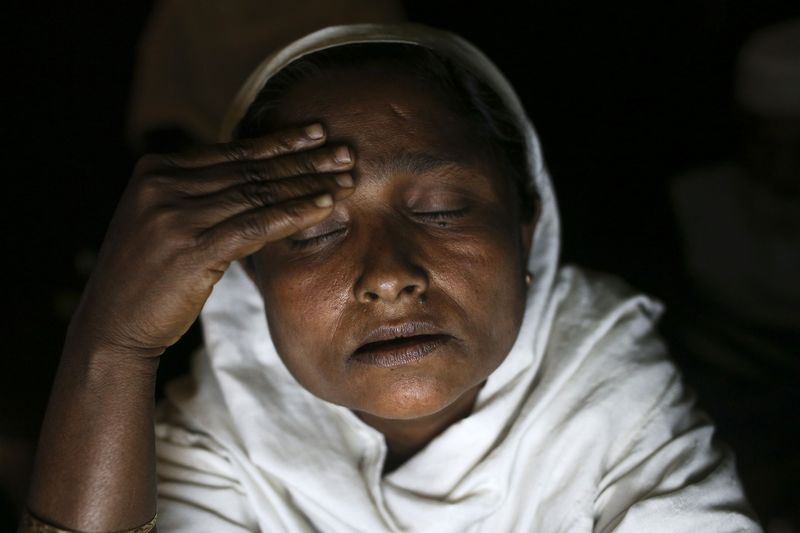By Andrew R.C. Marshall
THAE CHAUNG, Myanmar (Reuters) - In this teeming camp for displaced Rohingya Muslims in western Myanmar, it's easy to overlook the internet huts. The raw emotion they generate is much harder to ignore.
The huts have bamboo walls, thatched roofs and - most importantly - dusty laptop computers that allow Rohingya to reestablish contact with relatives who have left on boats for Thailand and Malaysia. The internet connection comes via cellphones jammed into the cobweb-strewn rafters.
Smoke from the camp's cooking fires seeps in through the flimsy walls. Sound drifts out just as easily, obliging callers to share their personal dramas with everyone nearby.
What emerges is an intimate portrait of the Rohingya, a mostly stateless people living in often grim conditions in Myanmar, where many consider them illegal immigrants. The huts also provide an insight into the human traffickers who profit from the boat-people and the families they leave behind.
Today, there is joy: Fatima, 56, is blessing her son's choice of bride. Connected via a Skype-like app, he sits in an internet cafe in the Malaysian capital Kuala Lumpur, where he works as a cleaner.
"Of course you must marry her, if her skin is fair," Fatima tells him. Her son promises to introduce his sweetheart in a later call.
Other exchanges are tragic or sinister.
Many people arrive with scraps of paper with a cellphone number with a Malaysian country code. These belong to the traffickers who each year ferry thousands of Rohingya to Thailand, where they are routinely held for ransom in remote camps near the border with Malaysia.
Freedom costs $1,200 to $1,800 - a fortune for most Rohingya living on a dollar or two a day.
A trafficker is demanding $1,400 to release Rahana's 12-year-old son. Rahana, who like many Rohingya women goes by a single name, has already sent $1,100, but the trafficker wants the balance.
At least she is allowed to talk briefly with her son. Usually, after an initial "proof of life" call, traffickers do not let relatives speak until paid in full.
A man answers the Malaysian number Rahana calls. "Let me speak to my son," she tells him. A few seconds pass. Then a small voice says, "Mum?"
Rahana's eyes fills with tears and her jaw trembles. She quickly composes herself.
"I will send the money," she tells the boy. "Then they will let you go." After the call, Rahana is dazed and fretful. "My son told me he was sick," she says. "Whenever he eats, he vomits."
"THEY TRUST ME"
Thae Chaung was a fishing village until 2012, when ethnic Rakhine Buddhists drove thousands of Rohingya from the nearby city of Sittwe. Religious violence in Rakhine State that year killed at least 200 people and left 140,000 homeless.
Today, Thae Chaung is a grimy, overcrowded camp. For most residents, a boat to Thailand is the only way out.
All those arrivals and departures presented Rohingya merchant Kyaw Thein, 29, with an opportunity.
Until 2012, he sold ice and gasoline to village fishermen. Now he runs a busy internet hut, charging 100 Myanmar kyat (10 cents) per minute for an overseas call on one of three battered laptops that are in almost constant use.
He provides other services too.
Rohingya working overseas routinely send money to relatives back home. This can be wired to the Sittwe bank account of a Rakhine middleman, who brings the cash to Kyaw Thein. He then gives it to the relatives - minus his 1.5 percent commission.
His windowless shack is also the conduit for thousands of dollars in ransom money.
Relatives entrust Kyaw Thein with bricks of kyat that he delivers to a Rohingya middleman in a nearby village. He says he does not charge for this service or deal directly with the traffickers. "They trust me," he says, "but I don't trust them."
In the past, Kyaw Thein says, Rohingya had to pay hundreds of dollars to board Malaysia-bound boats. Now, they pay only a few dollars to be ferried to large ships moored far offshore.
Their onward voyage is free - because traffickers know they can extort much higher sums by detaining these boat people once they arrive in Thailand or Malaysia.
Brokers roam the Rohingya camps dotted along the Rakhine coastline, says Kyaw Thein, and get a "finder's fee" from traffickers for each passenger they deliver.
Abdul Kadar blames these brokers for luring away his 14-year-old daughter. She left home one morning to visit a neighbor and never came back.
She is now in a camp in Thailand or Malaysia. The traffickers want $1,500 that Abdul Kadar, a whippet-thin rickshaw driver, cannot pay.
"They told me they would kick her off the top of a mountain," he says.
Abdul Kadar told them to find a man who wants to marry her, then ask him to pay the ransom. He knows he is effectively giving them permission to sell his daughter.
"All I have are worries," he says. "I can't do anything."
